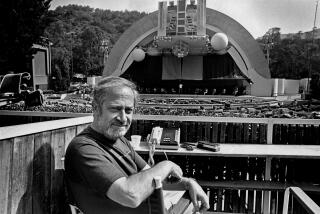MORE TO REMEMBER THAN ‘BABALOO’ : WHAT ABOUT DESI ARNAZ?
When Lucille Ball was “quite properly” installed in the Television Academy Hall of Fame, I, as a member of the selection committee, asked: “What about Desi Arnaz?”
Silence. Sic transit gloria mundi.
Only a few years before, Desi Arnaz bestrode the flickering world of television like a colossus. Programs bearing his Desilu imprint (and Ball always gave him full credit for developing that studio) dominated the networks’ schedules, and particularly the Top 10 shows, ranging from “Our Miss Brooks,” “Private Secretary,” “December Bride” and “Desilu Playhouse” to “The Untouchables”--and, of course, “I Love Lucy.”
I’m not sure he would quarrel with being remembered only as a song-and-dance man with a funny accent who played the bongos and sang “Babaloo” and loved Lucy. He was a performer of extraordinary skill, with a superb sense of timing. During the “I Love Lucy” days, he was often too involved with corporate matters at the studio to do much rehearsing, yet he could step into his role on show nights and give a polished performance.
It’s also well to be reminded that every evening you spend watching television, you are exposed to Desi Arnaz.
It was Desi who loudly balked when CBS wanted “I Love Lucy” to be produced live, the way almost all television was done in 1951. It was this upstart bongo player, this Cuban refugee, who defied the network and said he was not about to waste Lucille Ball’s genius on the empty air--there had to be some way to preserve her performances on film.
Legend has it that CBS shrugged and told him to go to it, feeling he would fall on his face. So with borrowed money and a rented sound stage, he and his associates created the three-camera technique to film a comedy as it played in front of an audience by simultaneously shooting various angles. This is the standard technique for TV comedy today.
Inadvertently, by putting comedy on film, he invented the rerun--and every hour of every day somewhere in the world a “Lucy” episode is being rerun.
He detested laugh tracks and mechanical laughter, and all of the laughter you hear on the “Lucy” shows and other Desilu comedies came from the audience, not from any machine. In fact, Desi used to say he could always recognize his mother-in-law’s laughter--”If she laughed, it meant we got a good show,” he once said.
He had an enormous capacity for living, this ebullient musician whom Xavier Cugat discovered working as a bus boy. He was a superb yachtsman, a tireless fisherman with the big game fish--one of the first sportsmen to build a home on the then remote coast of Baja California near Cabo San Lucas. He was a gourmet cook of Cuban dishes, and there are those who can never forget his rice and black bean casserole. He raised blooded horses and delighted to watch them run; he lived in Del Mar to be close to the track.
He was a strong man, a powerful man--an oak. He took a long time dying.
His timing, so precise on stage, wasn’t so good off; he’d outlived his fame. Yet I think the passing of Desi Arnaz should be marked by more than silence.
More to Read
The complete guide to home viewing
Get Screen Gab for everything about the TV shows and streaming movies everyone’s talking about.
You may occasionally receive promotional content from the Los Angeles Times.






